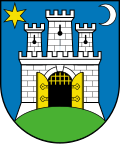 | |
| Broadcast area | Zagreb |
|---|---|
| Frequency | 100.5 MHz |
| Programming | |
| Format | Varied |
| Ownership | |
| Owner | Faculty of Political Sciences, University of Zagreb |
| History | |
First air date | November 1996 |
| Links | |
| Webcast | Official live stream, aac 128kbps |
| Website | www.radiostudent.hr |
Radio Student (100.5 MHz FM) is the first student radio station in Croatia, broadcasting since 1996 in Zagreb. The station is non-profit, non-commercial, serving as an educational radio for students of Zagreb University. It is located at the Faculty of Political Sciences, which is licensed to broadcast to a part of the city of Zagreb. [1]
